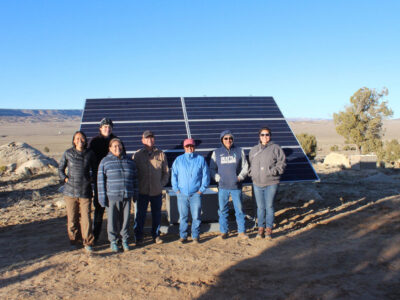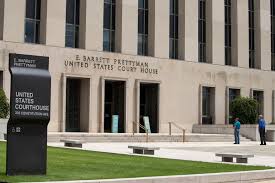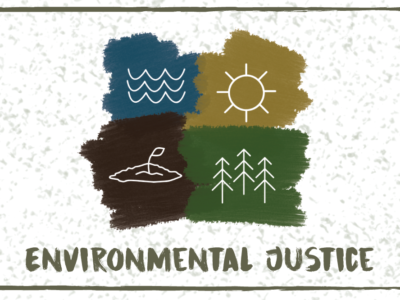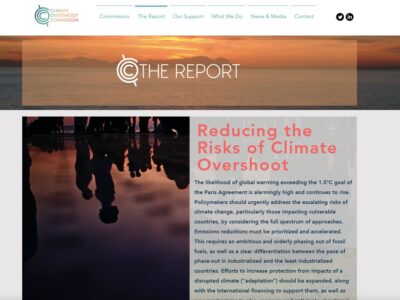RFK Jr. and Climate Change Conspiracy Theories
Voters who care about the climate should know the longtime environmental lawyer turned long-shot presidential candidate has turned away from environmentalism.
When an old acquaintance of mine recently shared a series of Robert F. Kennedy Jr. videos on Instagram, I couldn’t resist asking him what was appealing about the long-shot presidential candidate. He said that RFK Jr. would end corporate influence, including when it comes to industries that pollute the environment. RFK, he said, has done more on climate change as an environmental lawyer than Biden ever has. That viewpoint—though fringe—is a problem that we shoul...
CONTINUE READINGThe Climate Crisis, the Tribes, and the IRA
Biden's signature climate law spotlighted the need to support tribal responses to climate change.
Five hundred and thirty-one years ago today, Christopher Columbus went ashore at Guanahaní, an island in the Bahamas. That date marked the beginning of an era of European settlement and colonialism, accompanied by widespread destruction of existing American societies. Today, Native Americans communities face another crisis: climate change. Many tribes are at high risk from climate change. Tribes are especially vulnerable to climate change because they were displac...
CONTINUE READINGThe Not-So-Good News About Carbon Offsets
Recent studies show the significant limits to some carbon offsets. What's that mean for tropical forest jurisdictions?
In case you missed it: there’s some good news about Amazon deforestation continuing to plunge. Jason Gray and I spoke recently about why tropical deforestation is down in Brazil, Colombia, and Indonesia. That’s good news because deforestation of tropical forests is a huge source of greenhouse gas emissions. The World Resources Institute’s Forest Pulse report found that in 2022, emissions from tropical deforestation were equivalent to the annual emissions of I...
CONTINUE READINGReading the Tea Leaves: Biden’s and California’s Vehicle Regs at the D.C. Circuit
A leading environmental lawyer gives his perspective.
Transportation is now the source of 28% of U.S. greenhouse gas emissions, more than the electric power sector. The transportation sector is also a substantial source of nitrogen oxides and particulates, both of which are dangerous to human health. The Biden Administration has taken important regulatory actions bearing on these problems, with others in the pipeline. The fate of these measures depends on three cases argued before the D.C. Circuit in mid-September. To get...
CONTINUE READINGGermany’s Role in Climate Policy
A short history of climate action in Europe's economic powerhouse
We need to understand the history of climate action as we plan for the future. In terms of climate leadership, Americans tend to think of California. At the global level, however, Germany has its own claim to a leadership role, particularly in its early support for renewable energy. It has helped to shape EU climate policy, while at the same time its own policies were shaped by the EU’s. Although its track record has some complexities, this timeline of German action...
CONTINUE READINGCan We Use Regulation to Reduce Inequality?
Contrary to some, I think the answer is yes. And here's how we can do it.
Inequality is a burning issue in our society but plays only a limited role in the design of regulations. In an article that came out a week ago, I try to work through questions about how economic and racial inequality can be integrated into rule-making. In terms of economic inequality, the current system already has a built-in but controversial feature that promotes equality. The "value of a statistical life" represents the amount of money that society is willing to...
CONTINUE READINGAn Important Groundwater Bill Lands on the Governor’s Desk
Guest Contributors Gabi Rosenfeld, Owen McAleer, and Adrianne Davies say AB 779, a bill they worked on with State Assemblymember Lori Wilson, will address inequities in groundwater adjudications.
Earlier this month, California’s Legislature passed a slate of bills that cover a range of environmental and climate issues. Among those was Assemblymember Lori Wilson’s AB 779, a bill we helped create to improve the groundwater adjudication process for all water users. Adjudications legally determine groundwater rights but can take years and cost millions of dollars. This hurts all groundwater users, and is especially burdensome for small farmers, farmers of ...
CONTINUE READINGThe Overshoot Commission Addresses Geoengineering
The Commission tries to make it OK to talk about – not do – solar geoengineering. Its report proposes a moratorium, coupled with efforts to carefully build knowledge.
In this, my third post on the recently released report of the Climate Overshoot Commission, I’ll discuss their treatment of the most challenging and controversial part of their mandate, Solar Geoengineering or Solar Radiation Modification (SRM). As I noted in my introductory post on the Commission, I served as an advisor to the Secretariat and my students in the UCLA International Climate Law and Policy Clinic provided research and analytic support to the Secretariat. ...
CONTINUE READINGWhat’s a Major Question? (Judicial) Opinions differ.
Scholars don’t know the answer. Nor, apparently, do the federal courts of appeals.
In West Virginia v. EPA, the Supreme Court used the "major question doctrine" to overturn Obama’s signature climate change regulation. Once an issue reaches a certain level of significance, the Court says, Congress generally would want to make its own decision rather than allowing an agency like EPA to decide. Scholars have criticized the opinion for its lack of clarity about what makes an issue “major.” I decided to check out the court of appeals opinions...
CONTINUE READINGNo, There’s No Scientific Conspiracy About Climate Change
Anyone who thinks otherwise has never met a real live academic. We can barely conspire about where to eat lunch.
Among the host of conspiracy theories out there, a perennial one depicts climate science as a global hoax perpetuated by scientists. There are thousands of climate scientists around the world, which is an awful lot of people for a secret conspiracy. But even if there were only forty or fifty, a successful conspiracy of any kind would probably be well outside their capabilities. I speak as someone who, over the course of my career, has attended hundreds of faculty meet...
CONTINUE READING













